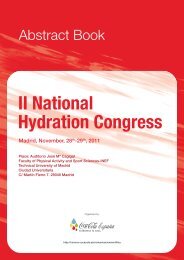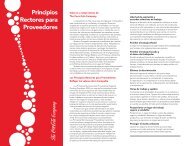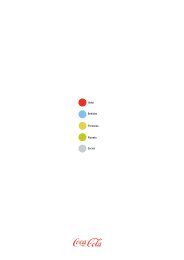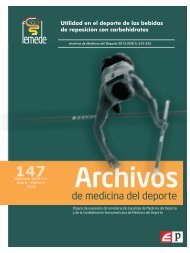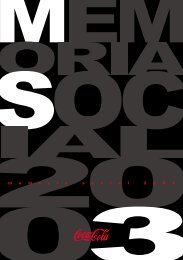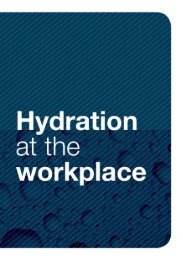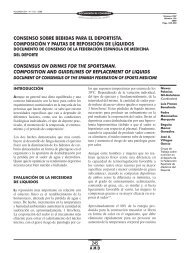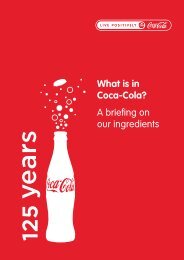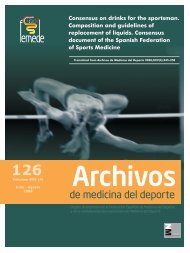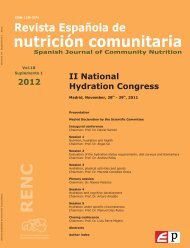athletes' medical information - Coca-Cola
athletes' medical information - Coca-Cola
athletes' medical information - Coca-Cola
Create successful ePaper yourself
Turn your PDF publications into a flip-book with our unique Google optimized e-Paper software.
athletes’ <strong>medical</strong> <strong>information</strong><br />
from the gut and minimise gastrointestinal<br />
disturbances. Dehydration, if sufficiently severe,<br />
can impair performance in most events,<br />
particularly in warm and high-altitude<br />
environments.<br />
Athletes should be well hydrated before<br />
exercise and drink sufficient fluid during<br />
exercise to limit dehydration to less than about<br />
2% of body mass. Chilled fluids may benefit<br />
performance in hot conditions. Athletes should<br />
not drink so much that they gain weight during<br />
exercise. Sodium should be included when<br />
sweat losses are high, especially when exercise<br />
lasts more than about 2 hours. During recovery<br />
from exercise, rehydration should include<br />
replacement of both water and salts lost in<br />
sweat. When athletes must compete in several<br />
events in a short time-period, strategies to<br />
enhance recovery of fluid and fuel are<br />
important. Low energy availability should be<br />
avoided, as it can impair performance and<br />
adaptation to training and may be harmful to<br />
brain, reproductive, metabolic and immune<br />
function, and to bone health.<br />
Dieting in young athletes should be<br />
discouraged. Robust immunity and reduced<br />
risk of infection can be achieved by consuming<br />
a varied diet adequate in energy and<br />
micronutrients, ensuring adequate sleep and<br />
limiting other life stress. Athletes should be<br />
particularly aware of their needs for calcium,<br />
iron and vitamin D, but the use of large amounts<br />
of some micronutrients may be harmful.<br />
Athletes at risk of disordered eating patterns<br />
and reproductive disorders should be promptly<br />
referred to a qualified health professional for<br />
evaluation and treatment. The use of<br />
supplements does not compensate for poor<br />
food choices and an inadequate diet, but<br />
supplements that provide essential nutrients<br />
may be a short-term option when food intake or<br />
food choices are restricted due to travel or other<br />
factors. Vitamin D may be needed in<br />
supplemental form when sun exposure is<br />
inadequate.<br />
Of the many different dietary ergogenic aids<br />
available to athletes, a very small number may<br />
enhance performance for some athletes when<br />
used in accordance with current evidence under<br />
the guidance of a well-informed professional.<br />
Athletes contemplating the use of supplements<br />
and sports foods should consider their efficacy,<br />
their cost, the risk to health and performance,<br />
and the potential for a positive doping test.<br />
Supplement use in young athletes should be<br />
discouraged, and the focus should be on<br />
consuming a nutrient-rich, well-chosen diet to<br />
allow for growth while maintaining a healthy<br />
body composition. To enjoy all the benefits of<br />
sport, athletes, whether they compete at the<br />
elite level or exercise on a recreational basis,<br />
should adopt specific nutrition strategies that<br />
can optimise mental and physical performance<br />
and support good health.<br />
Lausanne 27 October 2010<br />
62<br />
12-113-COC_Paralymics_Booklet_20120718.indd 62<br />
7/18/12 4:29 PM



